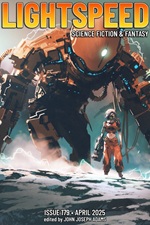“Does Harlen Lattner Dream of Infected Sheep? part I” by Sarah Langan
“To Navigate the Night” by Rich Larson
“Does Harlen Lattner Dream of Infected Sheep? part II” by Sarah Langan
“The Price of Miracles” by Nigel Faustino
“Meditations from the Event Horizon” by Deborah L. Davitt
“The Potter, His Daughter, and the Boy With Tribal Marks on His Face” by Oyedotun Damilola Muees
“TALK: The Siren Song of the Otherworld Goggles” by Dominica Phetteplace
“The Other River” by Jon Lasser
Reviewed by Mina
In “Does Harlen Lattner Dream of Infected Sheep? part I” by Sarah Langan, a middle-aged, divorced and lonely surgeon is called in to operate on an urgent case. When he opens up the patient, he discovers that his organs are gone, replaced by organic pink tubing. Untangling the tubing saves the man’s life, although he then promptly disappears. When the surgeon, Lattner, attempts to find out what is happening, he is blocked at every turn by Congo software, the employer-employee interface that has taken over the world. As the story progresses, we see people plugged into Congo behaving like green-tinged marionettes, then falling over and dying. Lattner wonders about an infestation or a parasite, but he gets nowhere in his investigations, not even when he calls his ex-wife, a lawyer at Congo.
As a subplot, he hooks up with an old lover, Geoff, after a school reunion. The less than perfect but very alive meeting contrasts sharply with the almost-walking-dead around them, all hooked up to Congo. There is a sense of rising menace.
“To Navigate the Night” by Rich Larson is short but powerful. A young bat that was badly mauled by an owl knows it will die when its mother and siblings fly south in the winter. A girl visits his tree begging for Noc’s Gift of sight. When it realises that her eyes have been gouged out, the young bat is willing to make a great sacrifice to help her. It is that sacrifice that will save its life and give it warm companionship too.
“Does Harlen Lattner Dream of Infected Sheep? part II” by Sarah Langan — let’s face it, this tale was never going to end happily. As everyone is transmogrified around him, including Geoff, Harlen realises Congo knew about the problem all along. Any similarities to immoral warehouse practices and soulless corporations are clearly intentional. Humanity goes under with a fizzle, not a bang, betrayed by profiteers with names like Simon Iscariott. Harlen learns from his past mistakes and grows as a character, but there is no one left to see or care: “There was irony, here, that at the exact moment humanity had chosen to delete itself, like an unwanted message, he’d chosen to come fully to life.” A very well-written tale but it should be followed by a stiff whisky!
In “The Price of Miracles” by Nigel Faustino, the protagonist is slowly going blind. Together with the love of their life, they attend an auction for a dead god’s assets in order to buy a miracle. But what is a miracle worth? The story felt a bit short for the detailed world building.
“Meditations from the Event Horizon” by Deborah L. Davitt considers what it would be like living on a ship locked in a stable orbit around a black hole. With time almost standing still as the universe passes you by — how do you not give into despair? Existential angst pushed to an extreme.
When practising magic is banned in “The Potter, His Daughter and the Boy With Tribal Marks on His Face” by Oyedotun Damilola Muees, a wizard decides to become a potter. With the help of a magical being living in a giant mahogany tree, the potter is able to make people from clay and give them life. In his loneliness, he creates a teenage daughter, Dayo. Unaware of her magic origins, Dayo ignores her father’s warnings about the dangers in the outside world. She leaves to follow a romantic fantasy but quickly encounters greed and deception, with people taking pieces of her magic body. Will her father be able to find her in time?
“TALK: The Siren Song of the Otherworld Goggles” by Dominica Phetteplace delivers exactly that, a fictional talk. The speaker, Tandy, talks of the alternate realities that her goggles allow her to watch but not interact in, where other Tandies lead different lives. Having once been addicted to her goggles, Tandy explains how she plans to make better use of them. The author weaves in currents of philosophical thought, such as: “We don’t have direct access to reality; everything we experience is filtered through our own consciousness, and we don’t have access to anyone’s consciousness but our own. Our so-called ‘agreed upon reality’ is basically just all of us dreaming the same dream, more or less.”
“The Other River” by Jon Lasser took patience to read and it didn’t feel like that patience was rewarded. The protagonist is high on amphetamines when her stolen jeep breaks down in the Saharan desert. She may or may not have an encounter of the third kind, or with death, or simply be hallucinating. I gave up caring, really.
Mina wrote these reviews listening to the sound of the sea on a Spanish beach. It’s good to leave the hustle and bustle of life behind for a bit.
 Lightspeed
Lightspeed